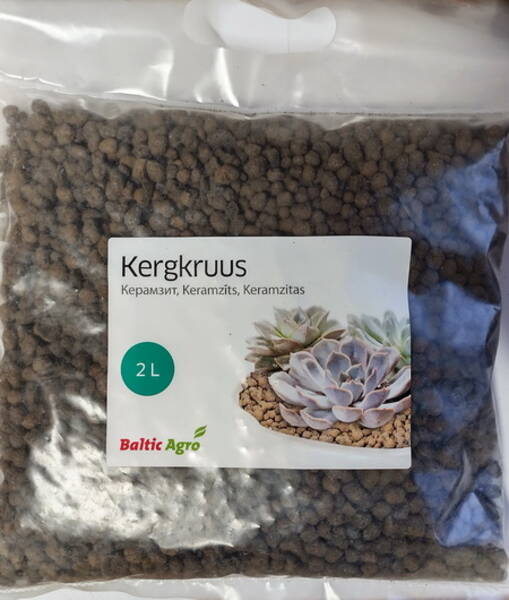Your shopping cart is empty!
Expanded clay (LECA, 2-4 mm)
Exclay - lightweight expanded clay aggregate (LECA).
The material is well suited for organic farming, as it is widely known for its lightness, strength and naturalness.
Light granules of expanded clay are an excellent medium for growing all indoor flowers, as they guarantee optimal conditions for the growth and health of plants: large fractions (more than 2 cm in diameter) are used in gardening, and medium (1–2 cm) and small (0.5- 1 cm and 0.2-0.4 cm) in potted gardening.
Due to its porous structure, expanded clay increases the hygroscopicity of the soil and perfectly saturates it with air, providing oxygen access to the roots of plants.
At the bottom of the pot, expanded clay granules create excellent drainage by regulating the amount of moisture in the substrate. After watering, clay granules absorb and retain excess water, gradually releasing it after the soil dries.
Clay has high thermal insulation properties, so small granules on the soil surface function as upper drainage and serve as thermal insulation, protecting the soil from overheating and rapid evaporation of moisture.
Foamed clay pebbles are an excellent material for creating vertical gardening in the house. In mixtures with flower soil, it provides lightness of construction and a sufficient supply of water and air for plants.
Many tropical flowers need high air humidity, and clay granules help to cope with the problem: they are poured into shallow containers, filled with water and placed next to the flower or placed directly on wet expanded clay.
Important qualities of expanded clay: the material is durable, does not decompose, does not acidify the soil, is not exposed to microorganisms, is completely safe, chemically inert to nutrient solutions and retains its properties for 3-4 years.
Big pluses are also the low price of expanded clay and the possibility of reuse.
The material is well suited for organic farming, as it is widely known for its lightness, strength and naturalness.
Light granules of expanded clay are an excellent medium for growing all indoor flowers, as they guarantee optimal conditions for the growth and health of plants: large fractions (more than 2 cm in diameter) are used in gardening, and medium (1–2 cm) and small (0.5- 1 cm and 0.2-0.4 cm) in potted gardening.
Due to its porous structure, expanded clay increases the hygroscopicity of the soil and perfectly saturates it with air, providing oxygen access to the roots of plants.
At the bottom of the pot, expanded clay granules create excellent drainage by regulating the amount of moisture in the substrate. After watering, clay granules absorb and retain excess water, gradually releasing it after the soil dries.
Clay has high thermal insulation properties, so small granules on the soil surface function as upper drainage and serve as thermal insulation, protecting the soil from overheating and rapid evaporation of moisture.
Foamed clay pebbles are an excellent material for creating vertical gardening in the house. In mixtures with flower soil, it provides lightness of construction and a sufficient supply of water and air for plants.
Many tropical flowers need high air humidity, and clay granules help to cope with the problem: they are poured into shallow containers, filled with water and placed next to the flower or placed directly on wet expanded clay.
Important qualities of expanded clay: the material is durable, does not decompose, does not acidify the soil, is not exposed to microorganisms, is completely safe, chemically inert to nutrient solutions and retains its properties for 3-4 years.
Big pluses are also the low price of expanded clay and the possibility of reuse.
* It should be noted that, unlike vermiculite, expanded clay absorbs water faster than it releases it into the ground, so consider this property when watering moisture-loving indoor flowers infrequently.















